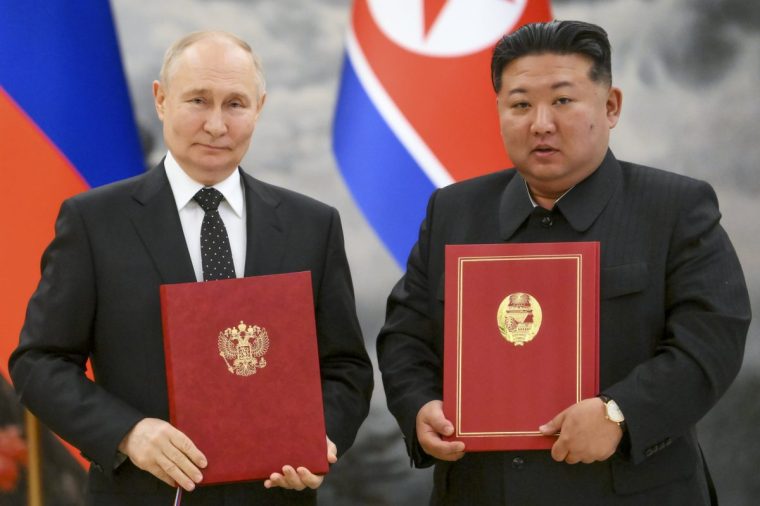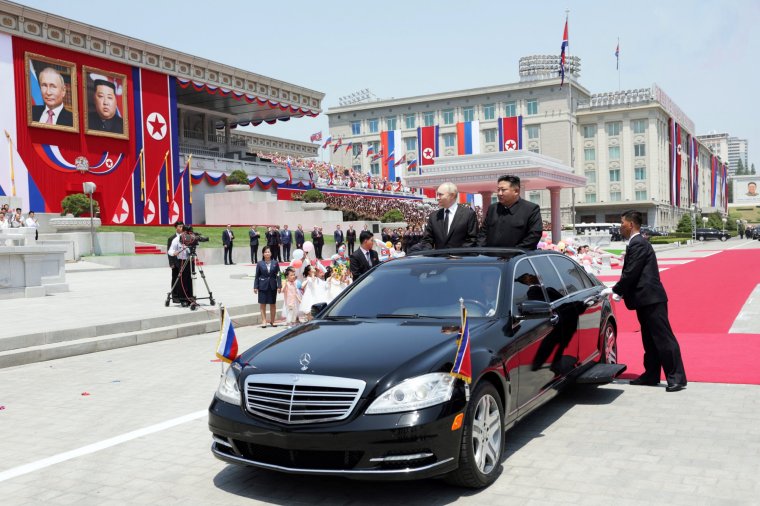Kim Jong-un ‘more emboldened ever’ as he commits more soldiers to Ukraine despite significant losses
North Korea could deploy up to 30,000 additional troops to reinforce Russian forces in Ukraine in exchange for advanced missiles and military technology, experts have told The i Paper.
The soldiers are expected to arrive in Russia in the coming months, according to a Ukrainian intelligence assessment seen by CNN and confirmed by a Western intelligence official.
Their deployment would follow the arrival of about 11,000 North Korean troops in November, who helped repel Ukraine’s incursion into Russia’s Kursk region.
Around 4,000 of those soldiers were killed or injured in the deployment, Western officials say – but Pyongyang remains committed to Moscow.
“My general view is that when Kim Jong-un agreed to send the first deployment of 11,000 troops last October, that was a very clear sign that North Korea wanted to show Russia it was going all in into the war,” said Dr Edward Howell, Lecturer in International Relations at University of Oxford.
“Because in return, Pyongyang knew that it could get significant benefits, particularly missile and military technology. We know this is what North Korea wants the most.
“As a result of that, this is why I think that despite the high number of casualties and deaths which have been admitted by Kim Jong-un, I don’t think this is going to stop him from sending more troops.”
‘More emboldened than ever’
North Korean state television recently aired rare footage of a sombre-looking Kim leaning over a coffin draped in the national flag, taken at a remembrance ceremony for soldiers killed in Ukraine.
While the growing number of fatalities could pose a risk of fostering public discontent, Dr Howell believes any uprising against the regime remains unlikely as “Kim Jong-un is more emboldened than ever”.
“Coronavirus was a very good excuse for the Kim regime to strengthen his societal control of the North Korean population,” he said. “I think Kim Jong-un feels fairly secure at the moment.”
Professor Ramon Pacheco Pardo, head of the Department of European and International Studies at King’s College London, agrees that Kim “feels that his mechanisms of repression are sufficiently developed to withstand any potential internal backlash or revolution”.
“That’s why he feels confident in more openly acknowledging that this is happening,” Professor Pardo said.
In late June, Ukraine’s defence minister, Rustem Umerov, said the troops deployed to Ukraine came from Kim’s “personal reserve” – a group of about 50,000 fighters chosen for their physical fitness, psychological resilience, and other stringent requirements.
Howel said: “We know that many of the soldiers who have been deployed up to now are some of the more ideologically indoctrinated individuals. Many of them, instead of being killed… would rather kill themselves out of loyalty to the Kim regime.”
Co-operation beyond the battlefield
North Korea is also supplying workers to Russia’s military-industrial complex, particularly in aircraft manufacturing, as well as the agricultural and construction sectors, according to Ukrainian state news agency Ukrinform.
As part of the co-operation agreements between North Korea and Russia, high-level delegations from Moscow have been making frequent visits to Pyongyang.

After one of these visits in late June, Sergei Shoigu, secretary of Russia’s security council, announced that North Korea would send 1,000 combat engineers and 5,000 military builders to help restore the Kursk region following the incursion by Ukrainian forces last August.
Moscow and Pyongyang also plan to create memorials for the North Korean soldiers who died while liberating the Kursk region, Shoigu added.
Length of Ukraine war will shape future relationship
The nature of the relationship between Pyongyang and Moscow will be shaped by how long the Ukraine war continues, according to Dr Howell.
If the war ends, Russia’s need for North Korean ammunition and weaponry will diminish, but their partnership is likely to continue growing in other sectors, he said.
“It will look different in a post-Ukraine world, as because of this relationship Russia will feel that it owes something to North Korea,” he said.
“What this war has done, is that it has taught Russia that during a time when Russia needed artillery, North Korea stepped in.”
Professor Pardo believes both countries benefit from their mutual co-operation and North Korea will support Russia as long as the war continues.

“I think at this moment, the two countries are a perfect match. And I do think that Kim Jong-un will continue to offer to Russia anything that Putin asks, because of the benefits it gets,” said Professor Pardo.
“From a North Korean perspective, for Kim Jong-un, this is an excellent opportunity to receive technology, to receive know-how, food, energy, that otherwise Russia may not be willing to provide,” he added.
For European countries, the co-operation between Russia and North Korea shows that “a conflict in Europe is not limited to the Euro-Atlantic sphere”, said Dr Howell.
“The Euro-Atlantic and the Indo-Pacific spheres are deeply interconnected. This is what North Korea’s involvement in the Ukraine war has shown.”
As North Korea’s military aims have now expanded beyond developing nuclear weapons to deepening collaboration with countries like Russia and Iran, Professor Pardo warned that “Europe needs to treat the North Korea threat very, very seriously”.
